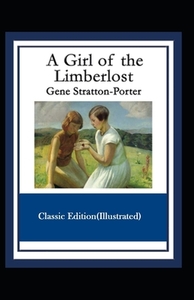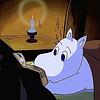Take a photo of a barcode or cover
I only read this book because I would be the fourth generation to read the book. The same book has been passed down through the generations and it was brought up at a family get together that I have yet to read it. I love classics but this one was hard to get through. I loved the heroine. She is a true testament to a woman who can persevere no matter her life situations. Always love that but I just couldn't get into the book fully.
I think I only discovered this because it was mentioned a few times on The Hairpin, and I've been exploiting the "free kindle books" options. I'm so very glad that I did. If you're tired of reading your Betsy-Tacy and L.M. Montgomery books over and over (As. If.), give this one a go.
I didn’t want this absolutely delightful story to end. Once again I find myself in the company of a protagonist that inspires me to be a better person. Elnora will remain with me for a long time, if not forever. She taught me about principles and self worth and friendship and love. She even loves nature as much, if not more, than I.
Each character in this special story may have flaws, but they reminded me that there is redemption and forgiveness. No one is perfect, but we can all be patient and thoughtful. We all deserve a little grace.
Each character in this special story may have flaws, but they reminded me that there is redemption and forgiveness. No one is perfect, but we can all be patient and thoughtful. We all deserve a little grace.
last read this book when I was 6, and I remember loving it then, even though I was mildly annoyed that it took me a whole week to read. This time it took me half as long, reading desultorily, so I feel somewhat vindicated of my 6-year-old-annoyance. The descriptions of nature absolutely enchanted me when I read it, and the more I think about it, this may have been what inspired me to really get into the outdoors. So much of what I read at that age made terribly strong impressions on me at the time. It's funny what things I remembered from this book...
I remember thinking the first time I read it how absolutely awful Elnora's mother was. Now, reading it again, I grew to like her by the end of the book, but I don't think my 6-year-old self ever did. I vividly remember a huge conflict over a white dress, which I almost thought I'd made up until I hit it around page 200. And I remember another huge conflict over the Yellow Emperor, which continued pretty much to the end of the book. I barely remember the guy in it at all...apparently 6-year-old-self was pretty uninterested in romance, which is a good thing. I remember the emotional impact the book had on me, but did I really understand what was going on with Mrs. Comstock and her husband? On the one hand, I think I did in a very vague way, but that's kind of disturbing. I was a scary child at 6...I think I would make myself uncomfortable now if I knew myself then. No kid should know that much! How did I get away with that? Even scarier thought, what would I be like now if I hadn't read so much? It's like some horrible alternate universe where I'm 5 times less mature and 10 times more annoying... Anyway, the book isn't the incredible feat of writing I thought it was when I was 6, but it was all so fresh and new to me then. The very idea of writing a book 450 pages long was astounding, and reading it was like discovering whole new worlds, even though the author was writing about my home state. I suppose Gene Stratton Porter was my first heroine; an Indiana authoress writing about twilight and violets and moths and the moon. It feels just like being home again, reading her descriptions, and it dredges up memories I didn't even know I had from evenings at home when I was little. Fascinating...
I remember thinking the first time I read it how absolutely awful Elnora's mother was. Now, reading it again, I grew to like her by the end of the book, but I don't think my 6-year-old self ever did. I vividly remember a huge conflict over a white dress, which I almost thought I'd made up until I hit it around page 200. And I remember another huge conflict over the Yellow Emperor, which continued pretty much to the end of the book. I barely remember the guy in it at all...apparently 6-year-old-self was pretty uninterested in romance, which is a good thing. I remember the emotional impact the book had on me, but did I really understand what was going on with Mrs. Comstock and her husband? On the one hand, I think I did in a very vague way, but that's kind of disturbing. I was a scary child at 6...I think I would make myself uncomfortable now if I knew myself then. No kid should know that much! How did I get away with that? Even scarier thought, what would I be like now if I hadn't read so much? It's like some horrible alternate universe where I'm 5 times less mature and 10 times more annoying... Anyway, the book isn't the incredible feat of writing I thought it was when I was 6, but it was all so fresh and new to me then. The very idea of writing a book 450 pages long was astounding, and reading it was like discovering whole new worlds, even though the author was writing about my home state. I suppose Gene Stratton Porter was my first heroine; an Indiana authoress writing about twilight and violets and moths and the moon. It feels just like being home again, reading her descriptions, and it dredges up memories I didn't even know I had from evenings at home when I was little. Fascinating...
My grandmother, who was from Indiana, gave me this book when I was a kid, and I read it then. I remembered it was about a girl in old-timey Indiana who collected moths and butterflies, and it was kind of cool that way. So when I saw a copy in a used bookstore (I don't know what ever happened to the copy Grandma gave me), I bought it to re-read it.
I remembered more details as I re-read them and they came back to life in my mind, which indicates this book must have made a deeper groove in my brain than I had realized. It's old-fashioned in its moralistic or prim or over-sentimental attitudes sometimes, but you know, it's still pretty cool. I read it all the way to the end, and these days I'm merciless about quitting a book somewhere in the middle if it fails to grab me sufficiently.
Our teenage heroine is Elnora Comstock--ouch, there's a clunker of a pioneer name for you--and I found it impossible not to like her, even though she's rather too perfect to be real most of the time. Her mom Kate, now, there was an interesting character: even in her early years of being cold and dour (you think you know how to be a bitter pioneer woman? KATE COMSTOCK WILL SHOW YOU HOW TO BE A BITTER PIONEER WOMAN), she shows flashes of intriguing depth and wit, and eventually comes around to happiness and warmth.
The moths! The butterflies! The nature! That's the best part, really. Okay, yes, from a modern perspective, it's disconcerting to see the scientific viewpoint being "Let's capture these moths, kill them with a dunk in gasoline, and pin them to boards, because we love them." But hey, conservation wasn't quite where it is now--and that's too bad, because as far as I can tell from the internet, the Limberlost Swamp is now gone, paved over with roads like most other wetlands, and I imagine many of those gorgeous moths are gone too. So the book's message of spending time in nature in order to become smarter, calmer, happier, and more in touch with reality is a worthwhile one.
I'm usually way into the romance, but this one was kind of a flop. OBVIOUSLY Philip was going to choose Elnora over the ridiculously, two-dimensionally horrible, shallow Edith (really, she starts out so selfish and evil that it's like she walked out of an Ayn Rand novel--but then, even she gets transformed by Elnora's unstoppable goodness by the end). So there was no real tension, just a lot of pointless chasing and waiting and moping and virtuously not kissing before the happy reunion.
Still: pretty moths! Strangely delicious-sounding homemade farm snacks! Glimpse of American high school circa 1900! Cool stuff for the most part.
I remembered more details as I re-read them and they came back to life in my mind, which indicates this book must have made a deeper groove in my brain than I had realized. It's old-fashioned in its moralistic or prim or over-sentimental attitudes sometimes, but you know, it's still pretty cool. I read it all the way to the end, and these days I'm merciless about quitting a book somewhere in the middle if it fails to grab me sufficiently.
Our teenage heroine is Elnora Comstock--ouch, there's a clunker of a pioneer name for you--and I found it impossible not to like her, even though she's rather too perfect to be real most of the time. Her mom Kate, now, there was an interesting character: even in her early years of being cold and dour (you think you know how to be a bitter pioneer woman? KATE COMSTOCK WILL SHOW YOU HOW TO BE A BITTER PIONEER WOMAN), she shows flashes of intriguing depth and wit, and eventually comes around to happiness and warmth.
The moths! The butterflies! The nature! That's the best part, really. Okay, yes, from a modern perspective, it's disconcerting to see the scientific viewpoint being "Let's capture these moths, kill them with a dunk in gasoline, and pin them to boards, because we love them." But hey, conservation wasn't quite where it is now--and that's too bad, because as far as I can tell from the internet, the Limberlost Swamp is now gone, paved over with roads like most other wetlands, and I imagine many of those gorgeous moths are gone too. So the book's message of spending time in nature in order to become smarter, calmer, happier, and more in touch with reality is a worthwhile one.
I'm usually way into the romance, but this one was kind of a flop. OBVIOUSLY Philip was going to choose Elnora over the ridiculously, two-dimensionally horrible, shallow Edith (really, she starts out so selfish and evil that it's like she walked out of an Ayn Rand novel--but then, even she gets transformed by Elnora's unstoppable goodness by the end). So there was no real tension, just a lot of pointless chasing and waiting and moping and virtuously not kissing before the happy reunion.
Still: pretty moths! Strangely delicious-sounding homemade farm snacks! Glimpse of American high school circa 1900! Cool stuff for the most part.
I see why people have this book on shelves with names such as "Comfort Reads". It was definitely a feel-good book.
Still a great read! Also, a great insight into the mores, values, and lifestyles of the turn of the century. I enjoyed it as much as I did the first time.
The fact that it's a free book from KOBO makes it all the better :)
The fact that it's a free book from KOBO makes it all the better :)
Read when I was a pre-teen and enjoyed it very much at the time...




